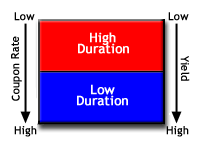Duration
Duration s the weighted average maturity of a bond's cash flows or of any series of linked cash flows. Thus the duration of a zero coupon bond with a maturity period of n years is n years. If there are coupon payments, the duration will be less than n years. Duration is a good measure of price sensitivity to interest rate changes (better than time to maturity of a bond, for example).
The term duration has a special meaning in the context of bonds. It is a measurement of how long, in years, it takes for the price of a bond to be repaid by its internal cash flows. It is an important measure for investors to consider, as bonds with higher durations carry more risk and have higher price volatility than bonds with lower durations.
When comparing bonds, you can either look at the "time to maturity", or (preferably) at the "duration", which is like a weighted average that tells you how long until the bond comes due. Duration is important in comparing two bonds, or mortgages against each other. It is also very important when hedging interest rate risk, and for matching the maturities of assets and liabilities on the balance sheet.
Note:
- Zero coupon bonds have a duration equal to the bond's time to maturity
- Holding other things constant, increasing the time to maturity....will increase duration
- Holding time to maturity, and the yield to maturity constant....a lower coupon rate will have a higher duration.
Duration: Other factors
Besides the movement of time and the payment of coupons, there are other factors that affect a bond's duration: the coupon rate and its yield. Bonds with high coupon rates and, in turn, high yields will tend to have lower durations than bonds that pay low coupon rates or offer low yields. This makes empirical sense, because when a bond pays a higher coupon rate or has a high yield, the holder of the security receives repayment for the security at a faster rate. The diagram below summarizes how duration changes with coupon rate and yield.

Types of Duration
There are four main types of duration calculations, each of which differ in the way they account for factors such as interest rate changes and the bond's embedded options or redemption features. The four types of durations are Macaulay duration, modified duration, effective duration and key-rate duration.
look here for more info: http://www.investopedia.com
Duration of Mortgages
A mortgage with an adjustable interest rate has a substantially shorter duration than an SFPM. For a mortgage of a given maturity, the decline in duration is a function of the ability of the contract rate to adjust to new market rates. At the extreme, an adjustable mortgage whose contract rate change matches every change in market rates would always have a duration of zero. This is because the mortgage would always be worth the principal due and there would be no change in the value of the mortgage due to changes in market interest rates.
It should be pointed out that the use of adjustable mortgages does not eliminate the interest rate risk exposure; it transfers that risk to the borrower. This transfer is a touchy political issue and represents one of the reasons that the regulatory authorities have taken so long to authorize adjustable mortgages.
for more info: source